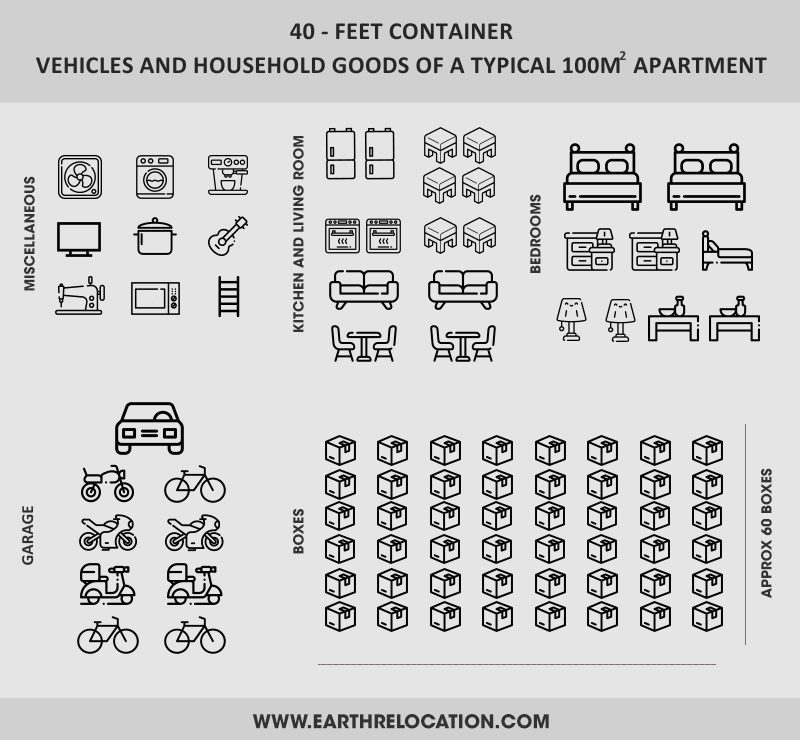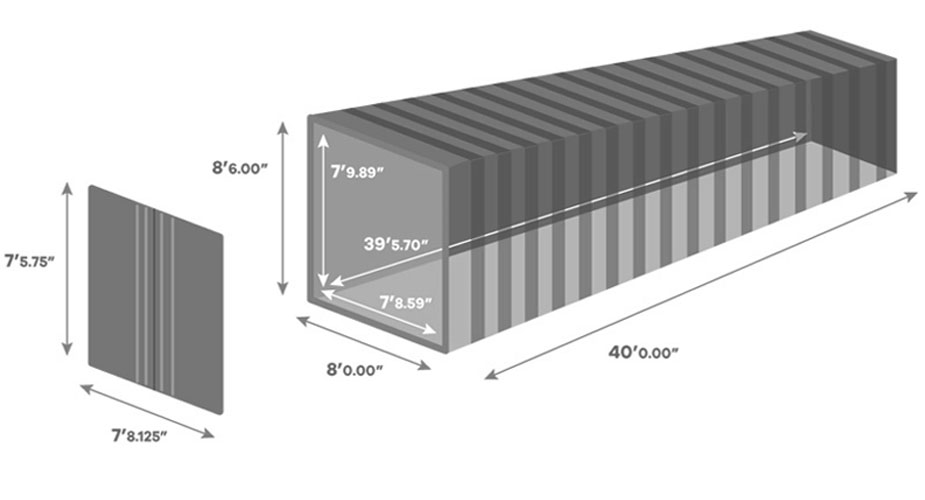- October 12, 2020
When it comes to international shipping, choosing the right container is crucial for ensuring a smooth and efficient process. A 40 feet shipping container is an ideal choice for those needing to transport large quantities of goods, bulk cargo, or belongings from larger households. Its capacity makes it perfect for businesses or families moving overseas, especially when a 20-foot container isn’t sufficient.
This article explores everything you need to know about a 40 feet shipping container, including its dimensions, capacity, and what makes it an excellent option for international shipping. Whether you’re shipping personal belongings or business inventory, understanding the features and benefits of a 40 feet shipping container can help you make an informed decision.
Dimensions of a 40 Feet Shipping Container
Before deciding to opt for single-use or buying, it’s essential to understand the dimensions of a 40 feet shipping container. These standardized containers are designed to meet international shipping requirements, making them reliable and versatile for large-scale relocations or shipments.
| External Dimensions | ||
| Dimension | Feet | Meters |
| Length | 40 feet | 12.19 meters |
| Width | 8 feet | 2.44 meters |
| Height | 8 feet 6 inches | 2.59 meters |
| Internal Dimensions | ||
| Length | 39 feet 5 inches | 12.01 meters |
| Width | 7 feet 8 inches | 2.33 meters |
| Height | 7 feet 10 inches | 2.39 meters |
| Usable Capacity | N/A | 67.7 cubic meters |
These dimensions make the 40 feet shipping container a versatile choice for both residential and business use, offering ample space for bulk goods or oversized items.
How Much Can a 40 Feet Shipping Container Accommodate?
One of the biggest advantages of a 40 feet shipping container is its capacity. It offers nearly twice the storage space of a 20-foot container, making it ideal for larger shipments or when consolidating multiple smaller shipments into one.

Residential Capacity
For households moving internationally, a 40 feet shipping container is large enough to accommodate the contents of a 3- to 4-bedroom house, including furniture, appliances, and personal belongings. Alternatively, it can also fit one car and the contents of a small household, making it perfect for families that want to transport both their vehicle and household items in a single shipment.
| Household Size | Capacity |
| 3- to 4-bedroom house | Entire contents |
| One car + small household | Fits both efficiently |
| 2 smaller households (combined) | Possible with careful packing |
Why Choose a 40 Feet Shipping Container for Accommodation Needs?
The ability to fit both residential and business needs makes a 40 feet shipping container a highly versatile option. Its size is particularly beneficial for those with large-scale shipping requirements who want to consolidate items into one container for easier logistics and cost efficiency. Whether you’re shipping the contents of a large home, a car and household goods, or bulk business inventory, this container has the capacity to handle it all.
With its generous space and compatibility with international shipping standards, a 40 feet shipping container is a practical and reliable choice for large-scale international relocations or shipments.
Logistics and Transportation for a 40 Feet Shipping Container
Logistics and transportation are critical aspects of using a 40 feet shipping container for international shipping. The container’s larger size offers significant storage benefits, but it also requires careful planning to ensure smooth transport.
Transportation Requirements for a 40 Feet Shipping Container
A 40 feet shipping container is twice the length of a 20-foot container, meaning it requires more space and specialized equipment for transportation. This can include larger trucks, flatbeds, and cranes for loading and unloading. The container’s weight, when fully loaded, also adds to the complexity of transport.
Key Transportation Requirements:
- Truck and Trailer Size: Requires a larger trailer or flatbed for overland transport.
- Port Handling: Ports often use cranes to load and unload 40-foot containers onto ships.
- Space for Delivery: Ensure there’s enough space at the destination for unloading and placement.
Simplified Logistics with single-use
Using a single-use 40 feet shipping container can simplify logistics significantly. Earthrelo handles many aspects of the process, including delivery, pickup, and transportation to and from shipping ports. This eliminates the burden of arranging specialized transport equipment and managing complex logistics.
Why Choose a 40 Feet Shipping Container for International Shipping?
A 40 feet shipping container offers unparalleled advantages for international shipping, particularly for those with larger shipments or specialized needs. From its ample capacity to its cost-effectiveness, this container is a smart choice for various use cases.
Space Efficiency
The 40 feet shipping container provides nearly double the capacity of a 20-foot container, making it ideal for consolidating large volumes of goods into one shipment. This not only reduces the number of containers needed but also minimizes shipping costs for bulk or oversized items.
Cost Efficiency
While the upfront costs for single-use or buying a 40 feet shipping container are higher than a 20-foot container, the additional capacity allows you to ship more items in a single trip. This makes it more cost-efficient for large-scale moves or shipments.
Versatility for Different Shipping Needs
The versatility of a 40 feet shipping container makes it suitable for a wide range of shipping requirements, from personal moves to business inventory. Its compatibility with international shipping standards ensures that your goods are protected and transported efficiently, regardless of the destination.
Buying vs. Single-Use Containers: Which Option is Right for You?
When deciding whether to buy or use a single-use 40 feet shipping container, your choice depends on factors like frequency of shipping, budget, and logistics preferences. Both options offer distinct benefits, and understanding them can help you make an informed decision.
Benefits of Buying a 40 Feet Shipping Container
Purchasing a 40 feet shipping container is an excellent choice for those who require consistent access to a container or have specialized shipping needs. Owning a container provides greater control, long-term value, and the ability to customize.
Benefits of Single-Use Containers
Single-use containers are best suited for one-time shipments or when shipping needs are inconsistent. These containers eliminate the responsibilities of maintenance, resale, and long-term storage, providing flexibility without ownership burdens.
Comparing Buying and Single-Use Options
Here’s a quick comparison to help you decide between buying and using single-use 40 feet shipping containers:
| Aspect | Buying | Single-Use |
| Upfront Cost | High initial investment | Lower cost for one-time use |
| Long-Term Use | Cost-effective for frequent shipping | Not suitable for recurring needs |
| Maintenance | Buyer’s responsibility | No maintenance required |
| Resale Value | Potential to recover costs | Not applicable |
| Environmental Impact | Long-term reuse reduces production needs | More sustainable if reused within networks |
Considering a 20 Feet Shipping Container Instead?
If a 40 feet shipping container offers more space than you require, consider using a 20 feet shipping container. While it has less capacity, it is compact, easier to handle, and more cost-effective for smaller shipments.
| Comparison | 20 Feet Container | 40 Feet Container |
| Length | 20 feet | 40 feet |
| Usable Capacity | 32.6 cubic meters | 67.7 cubic meters |
| Best For | Small households, car + 1-bedroom | Large households, bulk goods |
For more details, check out our comprehensive guide on 20 Feet Shipping Containers.




